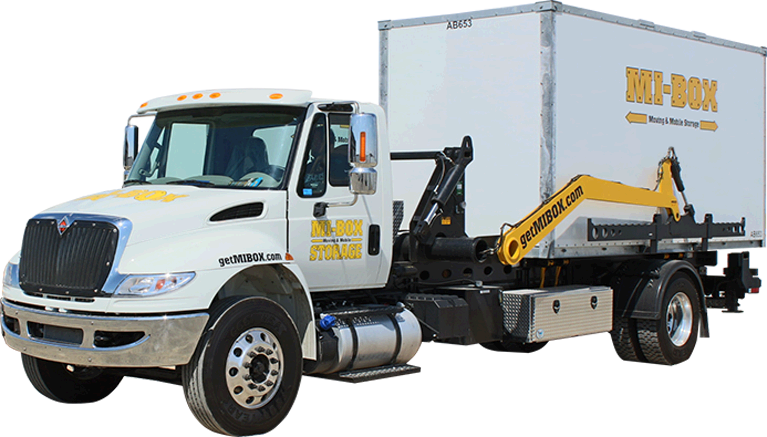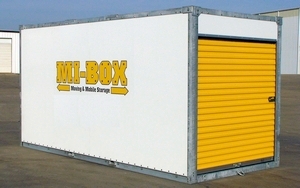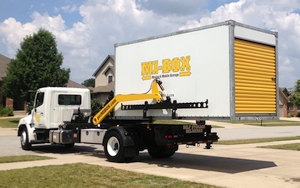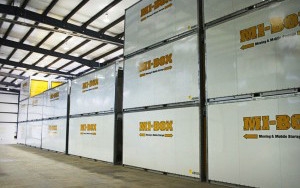Packing and Storage Tips – Packing
It is your responsibility to pack your goods so that they can travel over the road. We drive on the same roads and under the same conditions that you do, so pack your container for transport just like you would a rental truck. Using packing accessories such as Boxes, Packing Paper, Tape, Bubble-wrap and Moving Blankets will protect your goods while they are moved or stored.
Fill cartons completely so that they will not tip over or collapse.
Place heavy items like books or tools in small cartons so they are easy to handle. Be sure to pack books flat, not on their spines.
Pack a room at a time, and try to load your container that way. Be sure to keep notes on what you have packed in each MI-BOX mobile storage container (e.g., “John’s entire bedroom, Master bedroom, Jim’s tools, and Susan’s toys in container 519,” etc.). On each box, mark or label on the side and the top so you can see from any angle. You’ll save time when unloading by putting everything in the right place from the start. You won’t remember after a big move or a long time in storage, so label while you pack.
Clean and dry all appliances thoroughly before you store them. Give them time to air out and get to room temperature so that you won’t have any condensate. Moisture is your enemy. Keep sealed doors slightly open so they don’t get a musty smell. You can also put in a box of baking soda in the fridge and freezer to keep them smelling fresh. Be sure you wrap glass shelves that might break during moving.
Do your appliances or other items have special transportation instructions? For example, your electronics may have special padding needs or recommend using their original boxes. Appliances with moving parts such as washing machines or dryers may have bolts that secure the tub for transport. Be sure to secure those before you load.
Anything that has shelves or drawers should be emptied. Remember that just because your furniture can hold your possessions when standing still doesn’t mean that it is strong enough to hold them when they are moving.
Pack clothing and personal items in strong secure boxes that are taped up and labeled.
Cover mattresses and other textile furnishings with bags or plastic wrap to keep them clean and free of dust.
Be sure to vacuum out the couch and any chairs or other items that may have food crumbs. Mice are very small and can smell food very well, so make sure that you don’t pack things that attract them.
Remove the legs from tables or other items with odd-shaped appendages to help them pack efficiently.
Dishes, Glassware, and other kitchen breakables need special care. Before you box them, put a layer of bubble-wrap or crumpled packing paper in the bottom of the box. Wrap single items individually, nesting cups and bowls while standing plates, saucers, and the like on their edges (on a padded/cushioned surface). Be sure to label all of these cartons FRAGILE on the top and all sides. You can get big red stickers to do this. It’s worth it. These items stack high in your load, not at the bottom where they are likely to be crushed by heavy items on top.
For glass and mirrors, use specially designed boxes that store them on their edges. Always use bubble-wrap on these, and NEVER lay them flat. Load them between mattresses or other large, flat items that are standing on their edges.
If your storage is long-term, you may want to wrap your silver in non-acid tissue paper and apply a little light machine oil to any chrome or cast-iron services to retard rust. Storing firearms (always unloaded) particularly calls for this light-oil treatment.
Use original boxes, if you have them, to store your electrical items. They should be marked FRAGILE. If you don’t have original boxes, then double-wrap with bubble-wrap and seal well in cardboard boxes. Do not leave unfilled space in the cartons, but fill them with small items such as CD’s, DVD’s, and cables. Also, pack LP’s, cassettes, tapes, DVD’s, and CD’s on their edges to prevent warping.
Any unusual items with special packing or transportation instructions should be packed for transportation according to the original instructions if possible.
Computers generally follow the guidelines for other electrical items as above. Hard Disk Drives are more susceptible to shock, to place an extra layer of bubble-wrap or other padding at the bottom of any box storing computers. It is always a good idea to do a backup of your computer to a removable/portable drive (e.g., external USB drive) and take it with you rather than storing it.
Remove batteries from items headed for long-term storage. Leaking old batteries may damage your items.
For power equipment from the garage that uses gasoline, oil, diesel, kerosene, etc., always remove all fuels and oil before storing. This will save you from problems with leakage and old fuel gumming up your equipment’s carburetors and fuel lines. Remember that you are responsible for any damage to your equipment or contents, as well as the mobile storage container, caused by leakage or improper storage of your goods.





